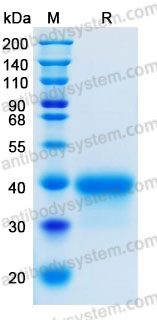Catalog No.
AHE95101
Biological activity
Immobilized Mouse EPHA6 at 1 μg/mL (100 μL/well) can bind human EFNA3 (Cat #: AHE95101) with a linear range of 0.3-113.9 ng/mL.
Expression system
Mammalian Cells
Species
Homo sapiens (Human)
Protein length
Met1-Ser213
Nature
Recombinant
Endotoxin level
<0.1 EU/μg of the protein by the LAL method.
Purity
>90% as determined by SDS-PAGE.
Accession
P52797
Applications
Bioactivity, ELISA, Immunogen, SDS-PAGE, WB
Form
Lyophilized
Storage buffer
Lyophilized from a solution in PBS pH 7.4, 5% Trehalose, 5% Mannitol.
Reconstitution
Reconstitute in sterile water for a stock solution. A copy of datasheet will be provided with the products, please refer to it for details.
Shipping
In general, proteins are provided as lyophilized powder/frozen liquid. They are shipped out with dry ice/blue ice unless customers require otherwise.
Stability and Storage
Use a manual defrost freezer and avoid repeated freeze thaw cycles. Store at 2 to 8°C for one week. Store at -20 to -80°C for twelve months from the date of receipt.
Alternative Names
EPLG3, EPH-related receptor tyrosine kinase ligand 3, EFL2, LERK-3, EFNA3, Ephrin-A3, LERK3, EFL-2, EHK1-L, EHK1 ligand
TMEM101 expression and its impact on immune cell infiltration and prognosis in hepatocellular carcinoma., PMID:39738479
Evaluation of circulating plasma proteins in prostate cancer using mendelian randomization., PMID:39287922
Identification of PI3K-AKT Pathway-Related Genes and Construction of Prognostic Prediction Model for ccRCC., PMID:39233640
hMAGEA2 Accelerates the Progression of Prostate Cancer via the EFNA3-Erk1/2 Signaling Pathway., PMID:38925815
Artesunate attenuates the tumorigenesis of choroidal melanoma via inhibiting EFNA3 through Stat3/Akt signaling pathway., PMID:38630320
Unlocking Overexpressed Membrane Proteins to Guide Breast Cancer Precision Medicine., PMID:38611080
A comprehensive characterisation of phaeochromocytoma and paraganglioma tumours through histone protein profiling, DNA methylation and transcriptomic analysis genome wide., PMID:38124114
microRNA-365 attenuated intervertebral disc degeneration through modulating nucleus pulposus cell apoptosis and extracellular matrix degradation by targeting EFNA3., PMID:38009813
Dual scaffold delivery of miR-210 mimic and miR-16 inhibitor enhances angiogenesis and osteogenesis to accelerate bone healing., PMID:37797708
Transcriptional regulation of the mouse EphA4, Ephrin-B2 and Ephrin-A3 genes by the circadian clock machinery., PMID:37551686
Genome-Wide Methylation Profiling in 229 Patients With Crohn's Disease Requiring Intestinal Resection: Epigenetic Analysis of the Trial of Prevention of Post-operative Crohn's Disease (TOPPIC)., PMID:37331566
A Multi-Trait Association Analysis of Brain Disorders and Platelet Traits Identifies Novel Susceptibility Loci for Major Depression, Alzheimer's and Parkinson's Disease., PMID:36672180
EphA4/ephrinA3 reverse signaling mediated downregulation of glutamate transporter GLAST in Müller cells in an experimental glaucoma model., PMID:36416239
A novel necroptosis-related gene index for predicting prognosis and a cold tumor immune microenvironment in stomach adenocarcinoma., PMID:36389725
Hsa_circ_0007478 aggravates NLRP3 inflammasome activation and lipid metabolism imbalance in ox-LDL-stimulated macrophage via miR-765/EFNA3 axis., PMID:36191606
Small extracellular vesicles derived from hypoxic mesenchymal stem cells promote vascularized bone regeneration through the miR-210-3p/EFNA3/PI3K pathway., PMID:35850484
The 1q21.3 region driver gene EFNA3 promotes disease progression via inhibition of lung adenocarcinoma cell apoptosis., PMID:35706812
LncRNA LINC01270 aggravates the progression of gastric cancer through modulation of miR-326/EFNA3 axis., PMID:35345980
The Pan-Cancer Crosstalk Between the EFNA Family and Tumor Microenvironment for Prognosis and Immunotherapy of Gastric Cancer., PMID:35309935
Identification of a Tumor Cell Associated Type I IFN Resistance Gene Expression Signature of Human Melanoma, the Components of Which Have a Predictive Potential for Immunotherapy., PMID:35269844
Ephrin-A3/EphA2 axis regulates cellular metabolic plasticity to enhance cancer stemness in hypoxic hepatocellular carcinoma., PMID:35227773
EFNA3 as a predictor of clinical prognosis and immune checkpoint therapy efficacy in patients with lung adenocarcinoma., PMID:34645436
Regulation of granulosa cell functions through NRP-1 mediated internalization of follicular fluid non-exosomal miR-210., PMID:34599690
Screening and Validation of the Hypoxia-Related Signature of Evaluating Tumor Immune Microenvironment and Predicting Prognosis in Gastric Cancer., PMID:34249015
Expression Pattern and Prognostic Value of EPHA/EFNA in Breast Cancer by Bioinformatics Analysis: Revealing Its Importance in Chemotherapy., PMID:33977106
Aggressive and recurrent ovarian cancers upregulate ephrinA5, a non-canonical effector of EphA2 signaling duality., PMID:33893375
Multiplexed targeting of miRNA-210 in stem cell-derived extracellular vesicles promotes selective regeneration in ischemic hearts., PMID:33879860
OSCC Exosomes Regulate miR-210-3p Targeting EFNA3 to Promote Oral Cancer Angiogenesis through the PI3K/AKT Pathway., PMID:32695810
Transcriptional Signatures That Define Ulcerative Colitis in Remission., PMID:32322884
MiR-210-3p-EphrinA3-PI3K/AKT axis regulates the progression of oral cancer., PMID:32180353
Prediction of blood-based biomarkers and subsequent design of bisulfite PCR-LDR-qPCR assay for breast cancer detection., PMID:32005108
Optimization of miRNA delivery by using a polymeric conjugate based on deoxycholic acid-modified polyethylenimine., PMID:31085260
Loss of the Spinocerebellar Ataxia type 3 disease protein ATXN3 alters transcription of multiple signal transduction pathways., PMID:30231063
Deletion of long noncoding RNA EFNA3 aggravates hypoxia-induced injury in PC-12 cells by upregulation of miR-101a., PMID:30125989
Oxycodone Self-Administration Induces Alterations in Expression of Integrin, Semaphorin and Ephrin Genes in the Mouse Striatum., PMID:29946272
miR-210 Enhances the Therapeutic Potential of Bone-Marrow-Derived Circulating Proangiogenic Cells in the Setting of Limb Ischemia., PMID:29908843
Comparative transcriptome analysis of the swimbladder reveals expression signatures in response to low oxygen stress in channel catfish, Ictalurus punctatus., PMID:29799804
Differentially expressed miRNA-210 during follicular-luteal transition regulates pre-ovulatory granulosa cell function targeting HRas and EFNA3., PMID:29131373
Gene Expression Profiling of Muscle Stem Cells Identifies Novel Regulators of Postnatal Myogenesis., PMID:27446912
Inverse Expression Levels of EphrinA3 and EphrinA5 Contribute to Dopaminergic Differentiation of Human SH-SY5Y Cells., PMID:27217159
MicroRNA-210 promotes sensory axon regeneration of adult mice in vivo and in vitro., PMID:27102143
EGCG ameliorates the hypoxia-induced apoptosis and osteogenic differentiation reduction of mesenchymal stem cells via upregulating miR-210., PMID:26780211
Targeted Gene Resequencing (Astrochip) to Explore the Tripartite Synapse in Autism-Epilepsy Phenotype with Macrocephaly., PMID:26537360
Dissecting the roles of Ephrin-A3 in malignant peripheral nerve sheath tumor by TALENs., PMID:25955218
EphrinB1 expression is dysregulated and promotes oncogenic signaling in medulloblastoma., PMID:25258252
EFNA3 long noncoding RNAs induced by hypoxia promote metastatic dissemination., PMID:25023702
MicroRNA-210 promotes proliferation and invasion of peripheral nerve sheath tumor cells targeting EFNA3., PMID:24512729
EphA2 promotes infiltrative invasion of glioma stem cells in vivo through cross-talk with Akt and regulates stem cell properties., PMID:24488013
Identification of the angiogenic gene signature induced by EGF and hypoxia in colorectal cancer., PMID:24180698
Impact of breast cancer surgery on angiogenesis circulating biomarkers: a prospective longitudinal study., PMID:23981902


